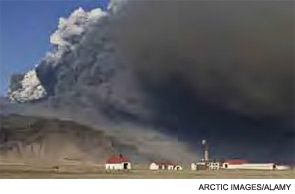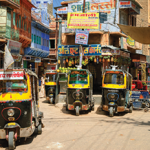
Editor’s note: This column concludes Dr. Pisetsky’s saga to travel home to the U.S. from a rheumatology meeting in Europe after the Eyjafjallajokull volcano in Iceland erupted.
An event like a volcanic eruption is so momentous that it inevitably becomes a metaphor for other bad happenings in life. Ash does not shine brightly, but its presence nevertheless illuminates the vagaries of existence and, most certainly, the cataclysms of illness. For those who suffer from them, serious medical conditions like rheumatoid arthritis (RA), lupus, and vasculitis are volcanoes. In the suddenness with which they strike, these conditions are devastating. They cause uncertainty and pain and, in an instant, can dramatically change perspective and transform sensibility.
My recent experience of traveling in Europe during the Icelandic volcano eruption demonstrates this situation in a clear—albeit minor—way. Before my wife and I went to the meeting in Mandelieu, France, we spent a few days in a town called Beaulieu-sur-Mer, staying in an old-fashioned pension. Although the place had charm and delicious croissants, I thought that the bed was soft and lumpy. For three days, I could survive while I tossed and turned to get comfortable. Of course, that bed was much better than the conveyor belt in the Madrid Airport where I catnapped while waiting to rebook a flight. Nevertheless, after 16 hours sitting scrunched in a van travelling from Nice, France, to Madrid, lying down on a belt was bliss, and I couldn’t have been more pleased by the accommodations.

Fate and Fortune
When patients with serious illness report a good quality of life, the favorable evaluation may reflect a recalibration of expectations that has little to do with the normal standards of life. People who get sick adjust their worldviews rapidly and find happiness in ways that would be almost inconceivable before they became sick. In the aftermath of the volcano and fearing an ordeal avoiding pickpockets while waiting for a flight, I was thrilled to just close my eyes.
In asking patients to describe their lives, we do not give them the time or latitude to explain the impact of their illness in a way that I have done with the account of my van ride. The trip, while tedious and annoying despite good company, was really just a small bump in the road, but its telling has consumed many words—now three columns total—and I could have gone on much longer. I have had the luxury of this column to elaborate on my journey. If I was a patient in clinic and this was a chief complaint, I would have been pressured to cut this account very short and reduce it to seconds.
For patients who have had their road in life wash away, we do not ask for a history with all of the nuances, vicissitudes, and emotional upheavals. Instead, we administer brief questionnaires and come up with a number like a Health Assessment Questionnaire of 1.3 or visual analog scale of pain of 4. Although these metrics are fine for scientific study, in the real world of patient care, they can be distancing. By reducing life to a number, they depersonalize and dehumanize. As providers, we may not be able to query patients about life’s details, but it would be very informative if we did.
One the themes of the Mandelieu meeting was the debate about nature versus nurture in disease pathogenesis, as if these two influences were equivalent. Look at what the volcano—a prime example of nature at its most furious and majestic—did to our society. When it erupted, it overwhelmed just about every modern artifice and electronic doodad—nurture at its apogee—in our world. Nature is very, very powerful.
As my wife said upon getting home from Europe the Sunday after the meeting, we dodged a bullet. While we completed an arduous trip reasonably unscathed—albeit groggy and dysphoric—we didn’t really dodge a bullet. Dodging implies action, but in reality we were passive—tired, frazzled, in need of a shower, and staring, frightened, with a deer-in-the-headlights look. Of course, in this case, the headlights were a screen from Expedia’s website.
If nothing else, Mother Nature is a gunner, prone to spraying bullets our way. The targeting and weaponry are variable, including sniping, strafing, and a full-out barrage—like a volcano—in which she blasts away. In such circumstances, just like catastrophic illness, you don’t dodge bullets. The bullets dodge you, for whatever reason.
To me, the venerable statement, “There, but for the grace of God, go I,” has never made much sense. To the extent that I got off relatively easily in the volcano’s ash shower, I do not think that God’s grace had anything to do with it, any more than a lack of God’s grace left some of my friends stranded for a week or hopscotching around the globe to get home sweet home. Although it may be comforting to think that God has shined his light down to give good fortune—whether a quick escape from the volcano or a remission from serious disease—it is all a mystery.
Comparing Stories
When I got home, I was reluctant to call or email friends who were still in transit from Mandelieu. I did not want to share my good luck, knowing they were still sleeping on the floor of an airport, cramped in the confines of a motor coach, or buffeted on the high seas in a British battleship. While misery loves company, a turn in fortune upsets the dynamics. Two people with active RA can share their troubles, but the conversation takes a distinct turn when one person hits the remission jackpot and the other languishes with a Disease Activity Score of 6.
In the wake of a traumatic event—a myocardial infarction, cancer surgery, a hurricane on the war path—people often say that they will take stock of their lives, reassess their priorities, and chart a new, more sensible course. Roasted and toasted in the cauldron of adversity, people say they have seen the light or, in this case, the dark cloud of volcanic debris. As we made our way down the highway to Madrid, the physicians in our group made the expected utterances: I won’t travel so much. I won’t schedule 30 patients on the Monday after a Sunday flight. I’ll limit overseas trips.
Such pledges sound good, but I doubt their sincerity or durability. I suspect that once a road warrior, always a road warrior. Back to the old routine, we will forget the duress of the van trip and all of the anxiety, fatigue, and discomfort we experienced on the road to Madrid.
So, when the invitation comes for the International Congress of Whatever or an advisory board of the latest and greatest biologic, we will all pack our bags, head to the airport, and work on our computers on the plane as we accumulate frequent flyer miles to get those upgrades.
To the travelers out there, I hope that you will never have to experience a late take-off, a cancelled flight, or a rerouting that leaves you up in the air with time on your hands. But, if bad luck strikes, I have a good idea. If you are with friends or want to meet the person sitting next to you in the plane, try this opening to get the conversation going: Arkansas.
Dr. Pisetsky is physician editor of The Rheumatologist and professor of medicine and immunology at Duke University Medical Center in Durham, N.C.
